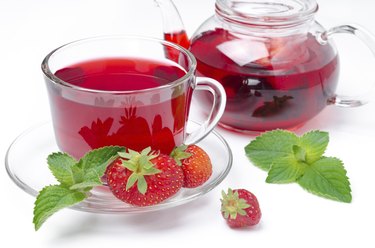
Despite the name, the strawberry is not a true berry but a pseudocarp, which means some of the fruit's flesh sprouted from nearby accessory tissue of the plant instead of an ovary. Nevertheless, the fruit provides sustenance for a variety of wildlife and a good reason for people to make jam. Although all members of the Fragaria genus bear strawberries of varying size and sweetness, F. vesca, also known as woodland strawberry, is the species used in folk medicine to make tea from the leaves. Traditionally, strawberry tea is used to treat diarrhea and is applied externally to ease inflammatory skin disorders and joint pain.
Plant Profile
Video of the Day
Fragaria vesca is a perennial member of the rose family also known as woodland strawberry, wild strawberry, English strawberry, alpine strawberry and mountain strawberry. The medicinal parts of the plant are the leaves, which are collected and air-dried when the plant is in flower. According to the King's American Dispensatory of 1898, the fruit is "highly spoken of in calculous disorders," such as gout, while the juice whitens teeth and counters fever and rash. The leaves are astringent with diuretic and diaphoretic properties, which means they increase urination and sweating, respectively. A decoction, or tea, made from strawberry leaf is reputed to effectively treat dysentery and diarrhea.
Video of the Day
Chemical Composition
Strawberry leaf, according to the "Physicians' Desk Reference for Herbal Medicines," contains caffeic acid derivatives, including chlorogenic acid. The flavonoids rutin and quercetin are present, as well as ellagic acid tannins and oligomeric proanthocyanidins. The presence of the latter suggests antioxidant properties, and the tannin content likely makes the use of strawberry tea to remedy intestinal inflammation effective.
Pharmacological Effects
There is no clinical proof that drinking strawberry tea, specifically, provides any health benefits. There is, however, evidence that compounds in the plant may reduce the risk of cardiovascular diseases. In the Oct. 22, 2008 issue of the "Journal of Agricultural and Food Chemistry," University of California scientists reported that strawberry polyphenolic compounds promote nitric oxide release and endothelium-dependent relaxation response by activating certain proteinase enzymes in coronary arteries. The May 16, 2009 issue of "Phytomedicine" included a study in which the authors concluded that the liquid extract of strawberry leaf directly exerts vasodilating effects in endothelium, the thin layer of cells that line blood vessel walls. Although heart rate and oxygen utilization did not increase, coronary flow increased up to 45 percent over control values.
Safety Issues
There are no significant adverse effects reported with the consumption of strawberry tea. However, check with your doctor if you take blood-thinning medications because strawberry compounds may increase their effects and the risk of bleeding. Also, strawberry is a fairly common food allergy, especially in children. If rash or other allergic symptoms develop, discontinue use and see your physician.
- Henriette's Herbal Homepage: Fragaria.—Wood Strawberry.
- “Journal of Agricultural and Food Chemistry”; Strawberry Extract Caused Endothelium-dependent Relaxation Through the Activation of PI3 Kinase/Akt; I. Edirisinghe, et al.; 2008
- “Phytomedicine”; Cardiovascular Effects in vitro of Aqueous Extract of Wild Strawberry (Fragaria vesca, L.) Leaves; I. Mudnic, et al.; 2009